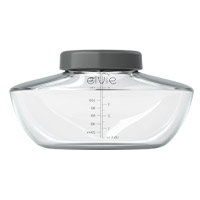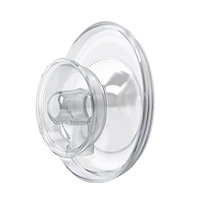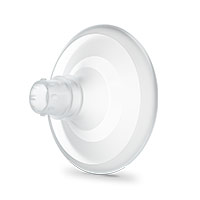During your breastfeeding journey, sometimes you can feel like you’re the only one who’s struggling with the less-than-rosy moments. In this article, we discuss some of the lows that come with all the incredible highs - from the initial few weeks to the end of your breastfeeding journey. We’ll also give you some advice on navigating the challenging times, because with the right support, you’re never alone, mamas.
A whole new role
If you ask even the most passionate breastfeeding mother, they will usually tell you that the first few weeks are challenging. Not only are you and your baby trying to establish a bond and a rhythm, but your body is still recovering from birth – while simultaneously taking on the new role of producing and distributing "liquid gold."
It can take a while for your body to get comfortable with breastfeeding, and between engorged breasts, cracked nipples, and having either a baby (or a pump) attached to you ten times a day, it’s normal to feel a bit of discomfort. 79% of women have said that they experienced pain during the first few weeks of breastfeeding – but the usual culprit for this is a poor breastfeeding latch.
Your comfort in the first few weeks depends on where your nipple lands in our baby’s mouth, and this depends on how your baby takes the breast, or latches to you. This is a simple fix, and you’ll know you’ve got a good latch if your baby’s chin and tip of nose are touching your breast. Keep an eye on their lips – they should be flanged (like a fish) instead of being tucked in. Once you’ve got a good latch, then voila! Your baby will fall into the right rhythmic suck-swallow-breath pattern, and your pain will be massively reduced.
But, it’s not just the physical factors that can contribute to stress in the initial stages of breastfeeding. Your hormones have been on the wildest ride of their life during pregnancy and labor, and this delicate balancing act continues during breastfeeding. Prolactin, dopamine and oxytocin are all intrinsically linked to both breastfeeding and our emotions, so, understandably, we can feel drained while trying to navigate feeding. Plus, around 30% of women also worry that breastfeeding means that their baby isn’t getting enough nutrients, which can compound the emotions of stress and anxiety.
The key to staying positive about breastfeeding and pumping is to make the experience as pleasurable for you as possible. Stock up on healthy, energy-boosting snacks, settle down somewhere really comfortable (maybe even invest in a breastfeeding pillow), and try to see it as an opportunity for some much-needed me-time. The life of a new-mum is busy and demanding, so take the chance to enjoy your favorite box set, or catch up with friends, while simultaneously knowing you’re doing something that will benefit your little one.
When your feeding journey ends earlier than hoped
This combination of both physical and emotional strain in the first few weeks is why many women decide to stop feeding and pumping – and we get it. Almost three-quarters of women start breastfeeding when their child is born, but this drops to 44% within 6 to 8 weeks.
Research from Swansea University found that mothers who stopped breastfeeding once they felt ready felt no impact on their mental health – and that a positive breastfeeding experience helps to boost emotional wellbeing! However, when speaking to mothers who stopped due to reasons beyond their control – such as lack of support or ongoing pain – their risk of postnatal depression was much higher. While this research makes for stark reading, the results are not that surprising.
The professor who led the research, Dr. Amy Brown, believes that a lack of support is one of the key reasons why women stop breastfeeding once they start to find it challenging - and with a survey indicating 60% of mothers stop breastfeeding because they struggle to get the advice and guidance they need, she’s probably correct.
"Breastfeeding might be normal, but that doesn’t always make it easy. You and your baby are both learning a new skill together, and that can take time. But it's important to know that if you are finding it difficult there are people out there who can help.” she explains. “Breastfeeding should not hurt and if you’re in any pain, do ask for support. You can ask your health professional, contact one of the main breastfeeding organizations, or search for a local lactation consultant. Some small changes can make a huge difference.”
Experiencing low mood during lactation
It’s normal to feel a whole range of emotions, including grief and anger if you have to stop before you’re ready – that’s understandable. But what if it’s not the stopping, the starting, or even the actual act of breastfeeding that’s impacting your mood – but rather the hormonal changes that occur when your milk comes in? Dysphoric Milk Ejection Reflex (DMER) is a rare condition which can cause mothers to experience a brief wave of negative emotions, just before their milk is released. DMER is still largely unstudied - we need more research before we can truly understand why it impacts a small number of women - but it is thought to be connected to the delicate balance of hormones involved in breastfeeding.
When it’s time to feed or pump, your oxytocin levels rise to trigger milk release and prolactin rises to make more milk. Dopamine – also known as the ‘happy hormone’ – drops to allow the prolactin to do its job efficiently. Most women will never notice this dip, however, (for the very few that experience DMER), the dopamine doesn’t drop properly, which causes a hormonal imbalance. This imbalance is what’s responsible for the brief wave of negative emotions, but it passes after a few minutes of pumping or feeding.
Dr. Saya Nagori, Founder of FemHealthProject.com experienced DMER with her son. While it wasn’t a condition she was familiar with, she knew straight away that her mood was changing every time she came to pump. “For 5 to 8 seconds of feeding, I felt an extremely deep and profound sense of sadness. It was such a powerful change from my usually bubbly personality, but about ten minutes into feeding, the feelings would subside – I knew it was connected to hormones.” While DMER is extremely rare, if you think you’re experiencing any of these symptoms, don’t hesitate to contact your doctor – they’ll be able to help you find the right support you need.
Finding support
For professional support and advice on everything from latching to feeding positions - there are mother-support groups you can reach out to including:
Global Health Media (offers a range of breastfeeding videos, available in nine languages)
It’s crucial to remember that while breastfeeding is a natural miracle, it can also be challenging. This is a time of readjustment for both you and your baby, but with a bit of practice and the right support - you’ll get there!











